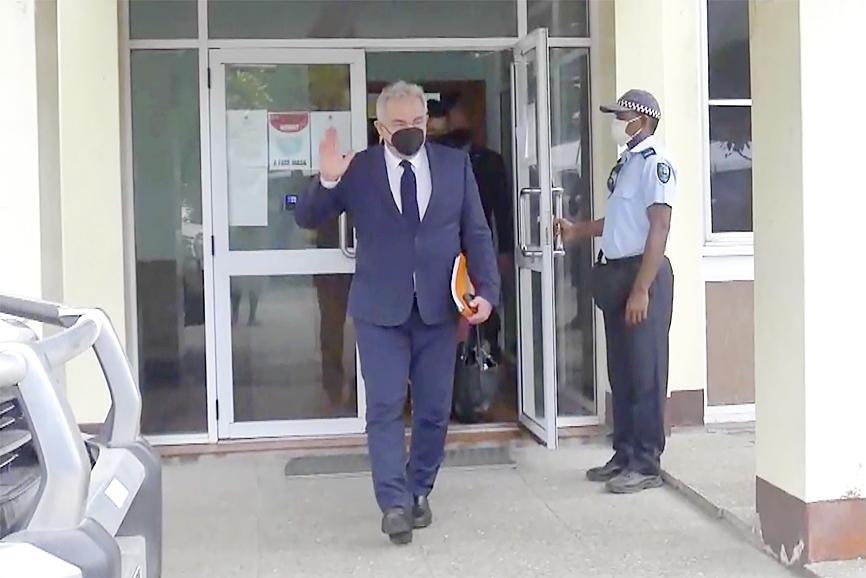US officials visiting the strategic Solomon Islands on Friday warned of serious repercussions if China were to establish a permanent military presence there after the Pacific nation signed a defense pact with Beijing.
A White House delegation in the capital, Honiara, delivered the stern warning on the same day that China’s ambassador attended an event with Solomon Islands Prime Minister Manasseh Sogavare — a sign of the importance both nations are according to the small island state.
The US and Australia — the Pacific nation’s traditional allies — are deeply suspicious of the defense deal, fearing it might give China a military foothold in the South Pacific.

Photo: AP
The White House said the officials had told Sogavare that the recently signed pact has “potential regional security implications” for Washington and its allies.
“If steps are taken to establish a de facto permanent military presence, power-projection capabilities, or a military installation, the delegation noted that the United States would then have significant concerns and respond accordingly,” the White House said in a statement.
US National Security Council Indo-Pacific Coordinator Kurt Campbell and US Assistant Secretary of State for East Asian and Pacific Affairs Daniel Kritenbrink led the delegation, which also included Pentagon officials.
“Sogavare reiterated his specific assurances that there would be no military base, no long-term presence and no power projection capability, as he has said publicly,” the White House said.
Beijing this week announced that it had signed the undisclosed security pact with Honiara.
A draft of the pact shocked countries in the region when it was leaked last month, particularly measures that would allow Chinese naval deployments to the Solomons, which are less than 2,000km from Australia.
Sogavare has said his government signed the deal with “eyes wide open,” but declined to tell parliament when the signed version would be made public, and his public assurances have done little to ease concerns in Washington and Canberra.
Too late to stop the security deal with China, the White House said its diplomatic delegation was visiting Fiji, Papua New Guinea and the Solomon Islands this week to “ensure our partnerships deliver prosperity, security and peace across the Pacific Islands and the Indo-Pacific.”
The US diplomatic team landed in Honiara just three days after the security pact with China was announced.
During a 90-minute meeting with Sogavare and two dozen members of his Cabinet and senior staff, the US officials discussed the expedited opening of a US embassy, healthcare assistance, vaccine deliveries and increased “people-to-people ties,” the White House said.
The delegation also met with opposition leaders and religious leaders.
Kritenbrink wrote on Twitter that he and Campbell had honored those lost during the Guadalcanal campaign in World War II.

Japanese Prime Minister Sanae Takaichi yesterday lavished US President Donald Trump with praise and vows of a “golden age” of ties on his visit to Tokyo, before inking a deal with Washington aimed at securing critical minerals. Takaichi — Japan’s first female prime minister — pulled out all the stops for Trump in her opening test on the international stage and even announced that she would nominate him for a Nobel Peace Prize, the White House said. Trump has become increasingly focused on the Nobel since his return to power in January and claims to have ended several conflicts around the world,

UKRAINE, NVIDIA: The US leader said the subject of Russia’s war had come up ‘very strongly,’ while Jenson Huang was hoping that the conversation was good Chinese President Xi Jinping (習近平) and US President Donald Trump had differing takes following their meeting in Busan, South Korea, yesterday. Xi said that the two sides should complete follow-up work as soon as possible to deliver tangible results that would provide “peace of mind” to China, the US and the rest of the world, while Trump hailed the “great success” of the talks. The two discussed trade, including a deal to reduce tariffs slapped on China for its role in the fentanyl trade, as well as cooperation in ending the war in Ukraine, among other issues, but they did not mention

REASSURANCE: The US said Taiwan’s interests would not be harmed during the talk and that it remains steadfast in its support for the nation, the foreign minister said US President Donald Trump on Friday said he would bring up Taiwan with Chinese President Xi Jinping (習近平) during a meeting on the sidelines of the APEC Summit in South Korea this week. “I will be talking about Taiwan [with Xi],” Trump told reporters before he departed for his trip to Asia, adding that he had “a lot of respect for Taiwan.” “We have a lot to talk about with President Xi, and he has a lot to talk about with us. I think we’ll have a good meeting,” Trump said. Taiwan has long been a contentious issue between the US and China.

GLOBAL PROJECT: Underseas cables ‘are the nervous system of democratic connectivity,’ which is under stress, Member of the European Parliament Rihards Kols said The government yesterday launched an initiative to promote global cooperation on improved security of undersea cables, following reported disruptions of such cables near Taiwan and around the world. The Management Initiative on International Undersea Cables aims to “bring together stakeholders, align standards, promote best practices and turn shared concerns into beneficial cooperation,” Minister of Foreign Affairs Lin Chia-lung (林佳龍) said at a seminar in Taipei. The project would be known as “RISK,” an acronym for risk mitigation, information sharing, systemic reform and knowledge building, he said at the seminar, titled “Taiwan-Europe Subsea Cable Security Cooperation Forum.” Taiwan sits at a vital junction on